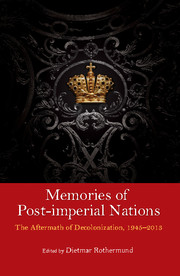Book contents
- Frontmatter
- Contents
- Preface
- Introduction
- 1 Memory of Empire in Britain: A Preliminary View
- 2 Ruptures and Dissonance: Post-colonial Migrations and the Remembrance of Colonialism in the Netherlands
- 3 A Distinctive Ugliness: Colonial Memory in Belgium
- 4 The Post-colonial Encounter in France
- 5 Ideologies of Exceptionality and the Legacies of Empire in Portugal
- 6 Post-colonial Italy: The Case of a Small and Belated Empire: From Strong Emotions to Bigger Problems
- 7 Post-imperial Japan in Transnational Perspective
- 8 Memories of Post-imperial Nations
- 9 A View from the Gallery: Perspective of a ‘Colonized’ on Post-imperial Memories
- Contributors
- Index
8 - Memories of Post-imperial Nations
Published online by Cambridge University Press: 05 September 2015
- Frontmatter
- Contents
- Preface
- Introduction
- 1 Memory of Empire in Britain: A Preliminary View
- 2 Ruptures and Dissonance: Post-colonial Migrations and the Remembrance of Colonialism in the Netherlands
- 3 A Distinctive Ugliness: Colonial Memory in Belgium
- 4 The Post-colonial Encounter in France
- 5 Ideologies of Exceptionality and the Legacies of Empire in Portugal
- 6 Post-colonial Italy: The Case of a Small and Belated Empire: From Strong Emotions to Bigger Problems
- 7 Post-imperial Japan in Transnational Perspective
- 8 Memories of Post-imperial Nations
- 9 A View from the Gallery: Perspective of a ‘Colonized’ on Post-imperial Memories
- Contributors
- Index
Summary
Comments
In an interview during the summer of 2013, British historian Timothy Garton Ash expressed his optimism concerning the future of Europe in spite of the economic crisis. ‘Europe is a unique creation after all. Nowhere has been achieved anything similar’, he argued, pointing to the transformation of European nations into peaceful, economically cooperating and transnationally solidary partners. This development, however, is neither self-evident nor consolidated, but needs to be confirmed daily against new challenges. Some of the nations that have lost their role as world players are now in a state post-imperial malaise and highly concerned with the reconstruction of their symbolic national capital instead of adapting to external and internal changes. The blow against imperial pride is often answered with nostalgic visions and compensated by efforts to restore the collective self-image. It is, therefore, an important task to look more closely into the transformation of these collective self images, studying their framing conditions in detail and offering concepts for a comparative analysis. My comments on this joint comparative study of post-imperial memories can take their point of departure from Dietmar Rothermund's list of five important aspects discussed in his introduction to the volume.
Memories of imperial nation-building
When speaking about ‘empires’ and ‘nation’-building, a few very general characteristics concerning these terms have to be brought to mind. Terms such as ‘imperial nations’ and ‘post-imperial nations’ refer to hybrid and complex historical amalgams challenge the neat categories of ‘empire’ and ‘nation’. If taken as ideal types, these terms can be defined by a few distinctive features serving as a preliminary heuristic orientation:
Empires
• are large;
• have no fixed boundaries but are bent towards expansion;
• are a strong centre-periphery distinction;
• are multi-lingual, multi-cultural and multi-ethnic states; and
• tend to grow by incorporating or annexing other territories/countries.
Nations, on the other hand,
• can be small as well as large;
• have fixed boundaries that are limited by other nations;
• are monolingual and culturally (if not ethnically) homogeneous; and
• are often created by splitting off and breaking apart, thus having an inbuilt tendency to become smaller and smaller.
- Type
- Chapter
- Information
- Memories of Post-Imperial NationsThe Aftermath of Decolonization, 1945–2013, pp. 171 - 180Publisher: Cambridge University PressPrint publication year: 2015
- 4
- Cited by



